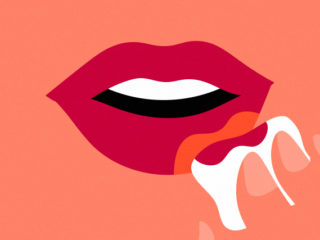
First, there was that problematic SkinWhite ad, and now this. The amount of BS in this world never ceases to amaze me. I’m talking about that billboard along EDSA, with the words “Maputi lang, ________ na.” (Just ‘cause she’s fair-skinned, ______ ) written across it, which you may or may not have noticed. The “anonymous ad” encouraged consumers to go to a site and share their “unfair” experiences with fair-skinned people. Once on the site, you’ll see mixed comments. Most recounted how those with fair complexion are often prioritized. One wrote, “My friend and I are freelance commercial models. Palaging mas nahihirapan ako sa kanya sa mga audition kasi mas mukha raw siyang foreigner kaysa sa ‘kin. ‘Yan daw gusto ng mga consumers, e mas nahihirapan ako kasi morena ako.” (I have a harder time at auditions because I’m morena, while she looks like a foreigner—something consumers prefer)
Others shared incidents where they felt discriminated upon, or downright insulted for their darker skin. “I remember a distant relative of mine first saw me. This was about when I was 7 or 8 years old. She greeted me ‘ang ganda mo pala.’ Then my lola snarkishly said ‘may kulay lang.’ Like it was my weakness.”
On the other hand, fair-skinned people tried to defend themselves as they understandably felt attacked. “Just because we’re fair skinned doesn’t mean we don’t work our asses off. It doesn’t mean we use it [to] our advantage. It’s just becoming a big deal because people make a big deal out of it. Never did we rub it off.” Another wrote, “Mahirap din namang maging maputi kasi nga, like on this website, iba ang tingin ng mga tao sa’yo. Grabe silang mag generalize, nakaka-downgrade na. Especially yung linyadang ‘maputi lang, di naman maganda’ kahit napaka unnecessary sabihin, sige pa din.” (It’s hard to be fair skinned too because, like on this site, people tend to look at you differently. They generalize too much, to the point that it’s downgrading. Especially with the line ‘she’s not beautiful, just fair-skinned.’ Even when it’s completely unnecessary to say, people still often do.)
Meanwhile, others thankfully tried to fight what the campaign was seemingly about. “I hate skin-whitening ads and skin-whitening products. But on the flip side, it’s also definitely unfair to crucify fair-skinned women. I think the issue should be, why are we putting a premium on how much (or little) melanin your body produces?” Someone else commented, “Let’s admit that yes, maraming advantages sa mata ng lipunan ang mga mestiza (colonial mentality yahoo) but let’s not turn on each other! Labanan ang beauty standards, wag ang isa’t-isa. Start educating people around you and we can change mindsets.” Honestly, they made so much more sense than the campaign itself.
Surprised, surprise. GlutaMax revealed themselves as the brand behind the ploy. This is one hell of a marketing gimmick, I’ll give GlutaMax that. I admit, I was intrigued. But that is where the ad’s merit ends. At first, I thought it was a way to call out fair-skinned people and urge morenas to embrace their skin—as is the trend (SkinWhite tried to achieve it but failed miserably). From the onset, it was obviously problematic as it pits women against other women and somehow demonizes fair-skinned people. But it turns out, the campaign is so much worse. I mean, not only did they manage to antagonize fair-skinned people, but they also somehow put them on a pedestal. To achieve both simultaneously—that’s sorcery right there.
In the unveiled ad, you’ll see two women looking at each other. The morena girl resentfully looks at the fair-skinned one opposite her who, in turn, stares back at her with a smirk. The words “Maputi lang, maganda na / na-hire na, artistahin na?” sit between them.
https://www.facebook.com/GlutaMAX/videos/2188803974782753/
“Wag magalit, mag-GlutaMax” was the ad’s ultimate message. The whitening product claims to gives morenas the “Fair advantage.” Um, really, GlutaMax? Are you sure you’re going with that narrative??
Someone please enlighten me. Because I can’t see how they thought this could work. I find it so ridiculous and bluntly offensive, I can’t help but wonder, what was their marketing team thinking?? Surely the point is to be thought-provoking. But it’s just so wrong on so many levels. No matter how much I try to twist it, I just can’t see any redeeming point to their campaign.
GlutaMax, since you are clearly tone-deaf, let me explain. Your campaign essentially translates to: “Yes, we have this prevailing belief that fair-skinned people are superior. We acknowledge that it’s totally unfair. But instead of changing this toxic, socially constructed belief, you should just change your natural skin color. You too can achieve that kind of ‘privilege’ by purchasing our product.” That is seriously f*cked up.
To suggest that in order to bridge the inequality between “demeaned” morenas and the “privileged” fair-skinned women—wherein the former needs to adjust—is harmful. Not to mention, it’s a load of bull. So is the idea that, by making their skin lighter, morenas’ dilemma of being marginalized will be solved? I mean, who would have thought GlutaMax is the great equalizer?
The fact that plenty of beauty brands are still capitalizing on women’s insecurities in 2019 is so infuriating. Instead of starting a conversation and telling women that the social bias is completely ridiculous and unfounded, GlutaMax chose to feed on the white privilege culture instead. It’s especially frustrating because here in the Philippines, we’ve always been amazingly diverse but colonial mentality still persists. It’s utterly disappointing.
(Honestly though, I can’t wait to see how they explain this mess.)
Art by Marian Hukom
For the latest in culture, fashion, beauty, and celebrities, subscribe to our weekly newsletter here
Follow Preen on Facebook, Instagram, Twitter, YouTube, and Viber
Related stories:
This new ad would like to believe that your skin color is a choice
Blackface or not blackface? The online reactions to SkinWhite’s controversial ad
Why you should teach your kids to love their skin color
Netizens call out vlogger Michelle Dy for skin-shaming


